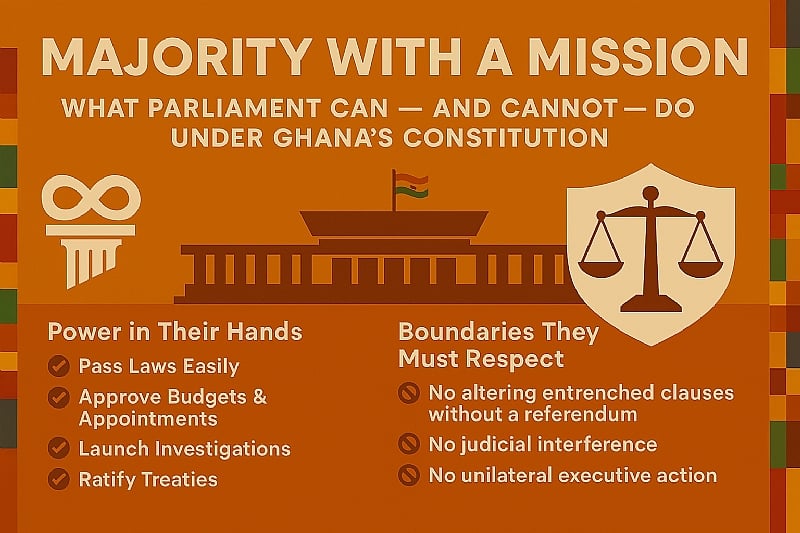🗣️With an overwhelming parliamentary majority*, the National Democratic Congress (NDC) holds historic legislative power — but true legacy lies not in control, but in how that control is exercised. This guide breaks down what the Constitution allows, what limitations remain, and how communities can expect — and demand — responsible stewardship.
✅ What Parliament Can Do with a Majority — Constitutionally
1. Pass Ordinary Legislation Swiftly
Enact bills supporting healthcare equity (e.g., MahamaCare, CHPS upgrades) Codify policies on asset recovery, ethical procurement, and digital governance
2. Approve National Budget and Policy Directives
Shape national financial priorities without gridlock Prioritize infrastructure for telemedicine and coastal resilience
3. Confirm Executive Appointments
Approve ministers, ambassadors, and key agency heads Empower integrity-based leadership across sectors
4. Initiate Constitutional Amendments (Non-Entrenched)
Modify sections like legislative procedures or decentralization tools Build stronger civic inclusion mechanisms 5. Launch Investigations and Oversight Campaign Probe scandals, audit fiscal leakages, and demand transparency Use committees to hold institutions accountable
6. Control the Parliamentary Calendar
Elevate bills for governance reform, cultural integration, and civic petitions
7. Ratify International Treaties
Push Ghana’s global identity through fair trade, health partnerships, and environmental agreements
🚫 Boundaries of Power — What the Majority Cannot Do Alone
1. Entrenched Constitutional Amendments
Clauses like presidential terms require: Referendum with 40% turnout 75% “Yes” votes to pass
2. Judicial Independence
Parliament cannot overturn or instruct the courts — legal decisions remain sovereign
3. Executive Limitations
Appointments originate with the President — Parliament can’t initiate but only approve
4. Media and Civic Counterbalances
Civil society, press, and public protests remain crucial to democratic checks
🧭 How Communities Can Shape Responsible Majority Rule
Track Legislation: Follow parliamentary bills that impact your region or sector Engage MPs: Request town halls and demand constituency updates Support Civic Campaigns: From petitions to participatory frameworks like Legacy Builders Loop Celebrate Cultural Symbolism in Governance: Push for Adinkra-infused policy formats and respectful ceremonial governance
🛠️ Recommended Non-Entrenched Constitutional Amendments
🏛️ Executive & Legislative Reforms
Cap the Number of Ministers and Deputy Ministers Limit total appointments to 55 to reduce fiscal burden and promote efficiency. Decouple Ministerial Appointments from Parliament (Article 78) Require MPs appointed as ministers to vacate their seats, ensuring separation of powers. Cap the Size of Parliament (Article 93 & 47) Fix the number of MPs at no more than 277, avoiding unchecked expansion. Ban MPs from Serving on Boards of SOEs Prevent conflicts of interest and restore parliamentary oversight integrity.
💰 Fiscal & Emoluments Reforms
Establish an Independent Emoluments Committee (IEC) Replace ad hoc Article 71 committees with a permanent formula-based system. Mandate Public Disclosure of Asset Declarations Require all public office holders to publish assets annually. Create a Fiscal Responsibility Clause Limit deficit spending and borrowing thresholds to protect future generations.
🧑🏾⚖️ Institutional Governance
Revise Appointment Procedures for Heads of Independent Bodies Introduce open competitive processes with parliamentary vetting for EC, NCCE, CHRAJ, etc. Fix Tenure for Inspector General of Police & Heads of SOEs Ensure security of tenure and reduce executive interference. Mandate Annual Performance Audits for SOEs Link funding to transparency and service delivery benchmarks.
🗳️ Electoral & Civic Participation
Enable Citizens to Propose Constitutional Amendments Introduce a mechanism for civic-initiated bills with minimum signature thresholds. Codify Civic Education in School Curricula Make constitutional literacy a national priority. Create a Constitutional Ombudsman Office Empower citizens to report violations and seek redress.
🌍 Cultural & Developmental Integration
Mandate Cultural Symbolism in State Ceremonies Recognize Adinkra and Kente as official civic design elements. Strengthen the National Development Planning Commission (NDPC) Make its long-term plans binding across administrations. Protect Natural Resource Governance Require parliamentary approval for major extractive contracts and royalties.
Retired Senior Citizen
Teshie-Nungua
[email protected]


